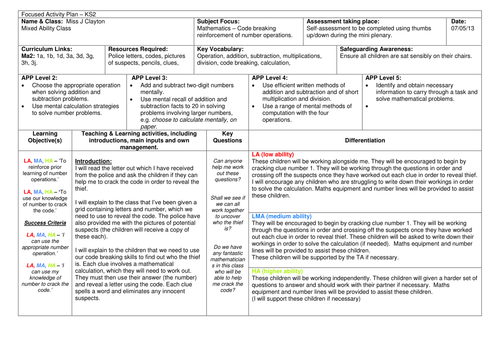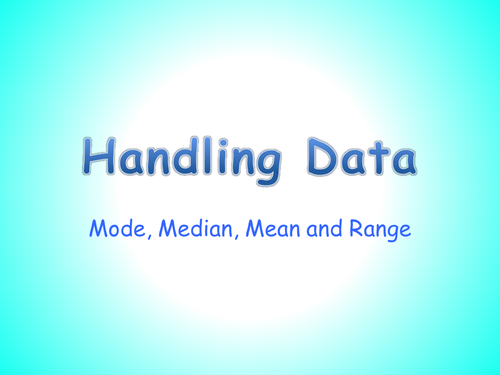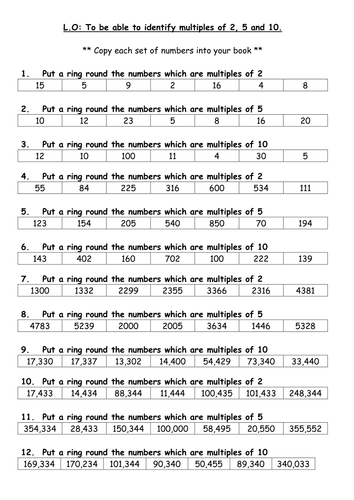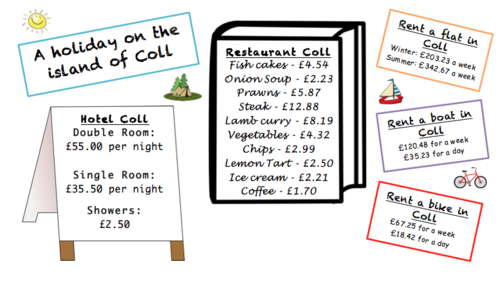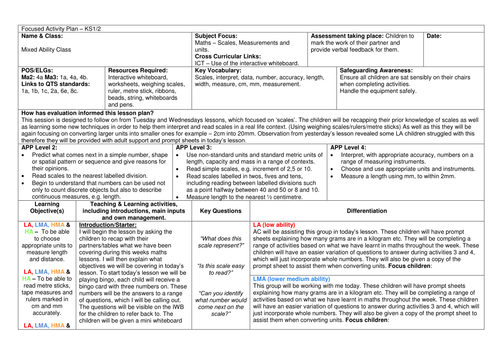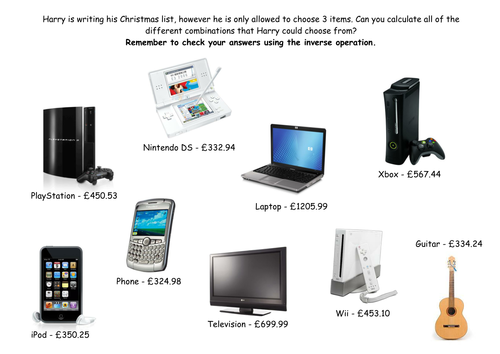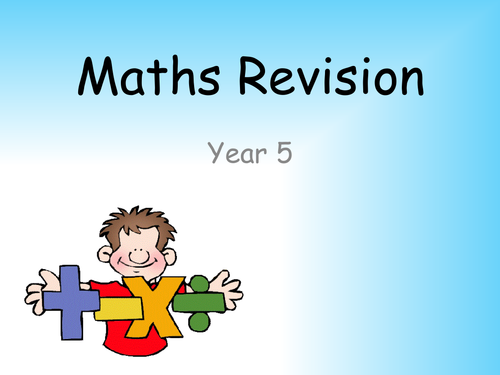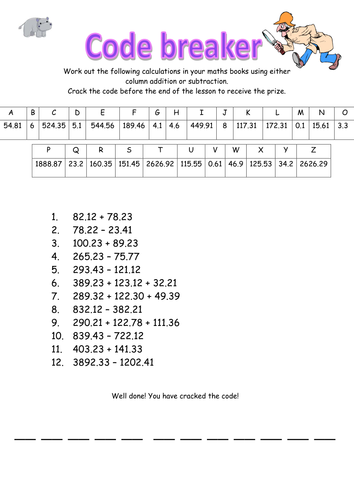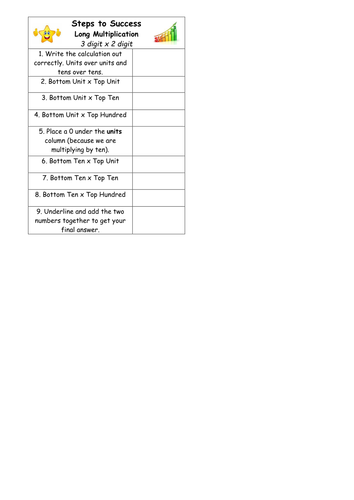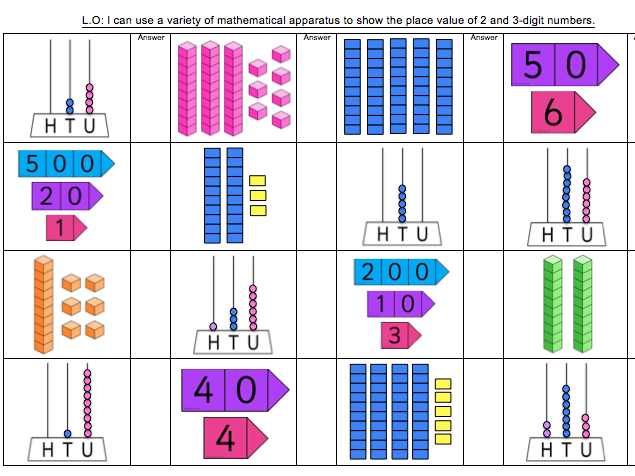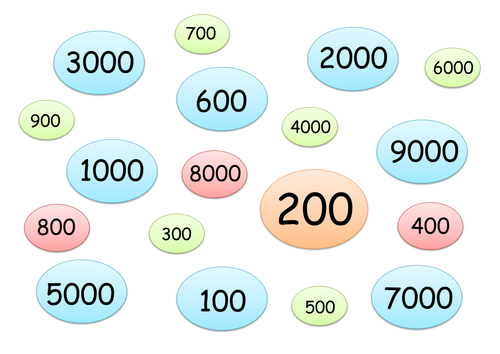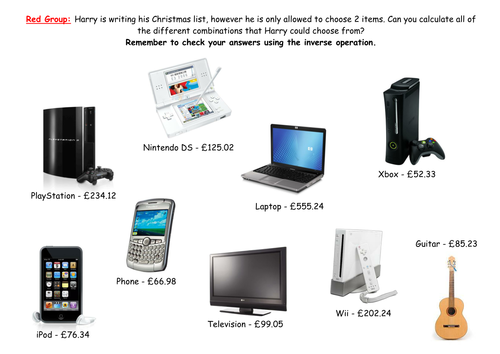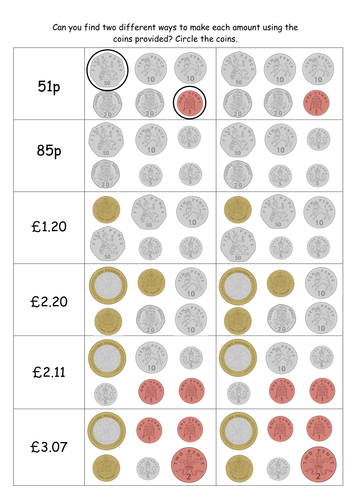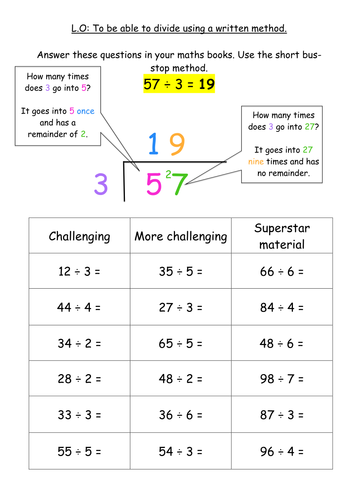
39Uploads
462k+Views
417k+Downloads
Mathematics

Amazing Code Breaking, Problem Solving Ofsted Maths Lesson!
I created this code breaking maths lesson for an Ofsted observation. The children thoroughly enjoyed it and had so much fun (whilst still learning).
The children are told that they have been selected by the local police to solve a crime. Unfortunately, all of the money from the school office has been stolen and an artist impression of the suspects has been provided. The children must crack the secret police codes to elimate the innocent suspects (cross them off) and reveal the final two suspects. Once this has been completed the last clue is placed on the IWB. Children get a reward for helping the police!
I have differentiated the 4 ways questions (HIPPO - the highest, MOUSE - the second highest, HA - third highest, LA - lowest) but they could be adapted to any year group! I have also included the lesson plan and PowerPoint to help clarify the task. Enjoy!
1st answer = MAN
2nd answer = HAT
3rd answer = BEARD
4th answer = GLASSES
5th answer = MOUSTACHE
6th answer = GINER
2 SUSPECTS LEFT = Kenny and Eric
THIEF IS = KENNY
*PLEASE NOTE I HAVE ADDED 2 ADDITIONAL DIFFERENTIATED SHEETS AND A POWERPOINT*

Mode, Median, Mean and Range PowerPoint
Introduction for KS2 maths on mode, median, mean and range with quick-fire tasks for the children to complete on mini-whiteboards.

Multiples and Factors UKS2 PowerPoint and Differentiated Activities
This is a collection of work based on Multiples, Factors and Squared Numbers. There is a detailed PowerPoint, which I used over 2 weeks and a range of worksheets and differentiated activities to complete.

Problem Solving Activity Decimals/Money
Problem-solving activity which includes multi-step problems differentiated 2 ways. Children will need a copy of the 'Holiday on the Island of Coll' problem-solving sheet to enable them to answer the questions.

Measurement, Scales, Missing Intervals, Converting Measures - KS2
Learning Objectives:
To be able to choose appropriate units to measure length and distance.
To be able to read metre sticks, tape measures and rulers marked in cm and mm accurately.
To be able to make sensible estimates of length in everyday contexts.
To be able to know how many millimetres there are in a centimetre or metre, and how many metres there are in a kilometre.
To be able to interpret a reading between two unnumbered divisions on a scale.
This lesson was an observation lesson and is based on a round robin of 4 activities (which could be spilt up into 4 lessons) used within a KS2 maths lesson. The activity was differentiated amongst 4 groups. LA-red, MA-blue, HMA-orange, HA-green. Children had to work out the missing intervals and complete each activity. A very detailed lesson plan (from my observation) has been attached and I have also attached the lesson expectations for each group to display on their tables to ensure they have met the learning objectives by the end of the lesson. Additionally, there is a game of Bingo whereby the children have to convert measurements. Each activity was set up on a different table and the children were given 10 minutes at each station.

Worksheet on Addition and Subtraction of Decimals
Worksheet on Addition and Subtraction of Decimals, designed for Year 6 to practice inverse operations. The children really enjoyed this activity.

Column Subtraction Bingo
Ask the children to choose 4 numbers from slide 3 and write them on their mini whiteboards. The children must work out the column subtraction either on whiteboards or in their maths books. First child to call bingo wins! Ask the children to choose a new set of numbers (or carry on playing)

Codebreaker Addition of Decimals Worksheet (Differentiated)
This is a codebreaking resource to reinforce the addition of decimal numbers. The children have to work out the calculations and match their answer to a coded letter at the top of the page. Once they have worked out all of the answers they will crack the code and receive the prize (it currently spells out - HOUSE POINT) but this could easily be adapted and changed. There are 2 differentiated codebreaker activity sheets (HA and LA).

Long Multiplication 'Steps to Success' KS2
Upon introducing Long Multiplication to my Y5 class, I found that providing them with a 'step to success' prompt really benefitted their understanding of the process. I began by teaching 2-digit x 1-digit then onto 3-digit x 1 digit and progressed onto 2-digit x 2-digit and finally 3-digit x 2-digits. I have also attached a PowerPoint presentation which I have adapted offline, which I used to aid my teaching.

KS1 Place Value Unit of Work
I created these visual activities to reinforce Place Value in KS1. There is 3 lessons worth of interactive Place Value activities. The children found the visual resources really engaging and enjoyed completing them. Each activity has been differentiated 3 ways.

Game on Multiplying by 10 and 100
Children to play this game in pairs. Focuses on multiplying by 10 and 100.

Addition and Subtraction of Decimals - Inverse
The children must choose three different items off the Christmas list and work out the total cost. They must find as many combinations as possible and check their answers using the inverse operation.
It has been adapted for HA, MA and LA but could be changed further if necessary.

Money - Finding Different Amounts
LA worksheet has the coins provided and the children are required to circle the amounts requested.
HA worksheet has the coins, which the children may use at the top. They must find three different ways of making each amount (using only the coins provided at the top).

KS2 Division Written Method - Bus Stop Method
Differentiated worksheets for an introduction to a written method of division with KS2.

